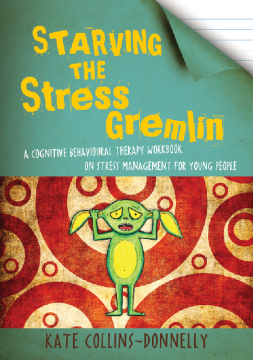
Additional Information
Book Details
Abstract
Watch out for the Stress Gremlin – he loves to feed on your stress, and as he gets bigger and bolder, you get more and more stressed! How can he be stopped? Don't give him any more stress to eat, and watch him and your stress disappear!
Starving the Stress Gremlin shows young people how they can manage their stress levels through a range of effective techniques based on cognitive behavioural principles. Engaging and fun activities as well as real life stories from other young people show how our thoughts are related to our behaviour and emotions, allowing young people to understand why they get stressed, the effects of stress and how to 'starve' their Stress Gremlin!
This informative workbook is easy to read and fun for a young person aged 10+ to complete either on their own or with the help of a parent or practitioner. It is also a valuable stress management resource for those working with young people, including mental health practitioners, youth workers, social workers and education sector staff.
This is a recommended read for any young person who has difficulty coping with stress. It is a practical guide that is easily to follow, and innovative. Young people who 'work' through this book will gain insights as well as coping strategies about the day-to-day challenges of stress.
Raychelle Cassada Lohmann, MS, LPC, professional school counselor and author of The Anger Workbook for Teens and co-author of The Bullying Workbook for Teens
Kate Collins-Donnelly is the author of Starving the Anger Gremlin: A Cognitive Behavioural Therapy Workbook on Anger Management for Young People and Starving the Anxiety Gremlin: A Cognitive Behavioural Workbook on Anxiety Management for Young People. Having worked as a therapist, psychologist, criminologist and anger management consultant based in the UK for many years, Kate presently runs a successful independent consultancy practice which provides cognitive behavioural therapy, counselling, coaching and training. She is head of the Psychological and Criminological Research Division.
